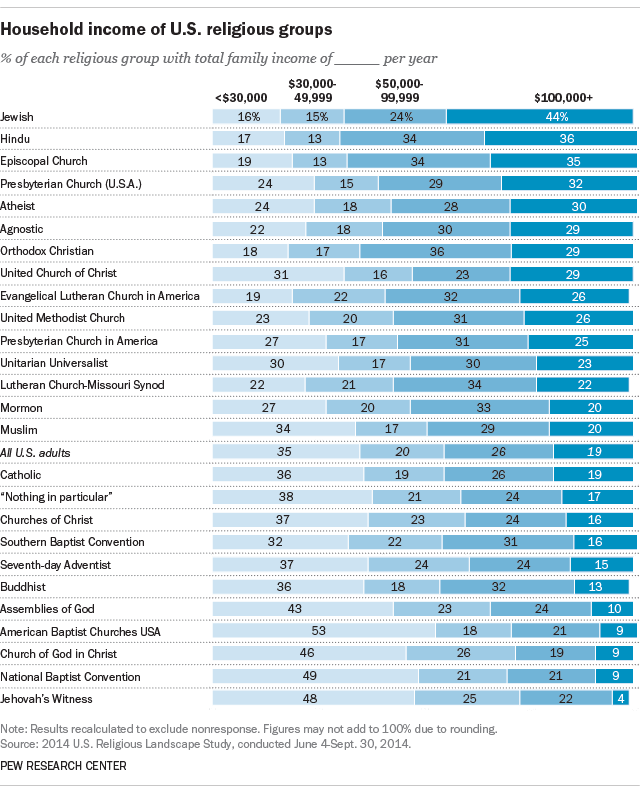Religion
Related: About this forumHow income varies among U.S. religious groups
OCTOBER 11, 2016
BY DAVID MASCI
While there is a strong and proven correlation between education and income, it’s harder to know whether there also is a link between religion and wealth. What we can say is that members of some religious groups – not to mention atheists and agnostics – on average have a higher household income than others and those in the richest religious groups also tend, on average, to be better educated than most Americans.

Some of the most financially successful religious groups – Jews, Hindus, Episcopalians, and Presbyterians – also are all among the nation’s most educated as well. These rankings, which come from our 2014 Religious Landscape Study, are based on the percentage of people within each religious group who reside in households with a yearly income of $100,000 or more.
About four-in-ten Jews (44%) and roughly a third of Hindus (36%) and Episcopalians (35%) live in households with incomes of at least $100,000. Again, these groups also have high levels of educational attainment. For instance, nearly half of Hindu adults and almost one-third of Jewish adults hold postgraduate degrees. Indeed, in addition to education, other factors, such as age, race and ethnicity also are correlated with both religion and income.
Members of three other mainline Protestant denominations – the Evangelical Lutheran Church in America, the Presbyterian Church (U.S.A.) and the United Methodist Church –also have high household income. So, too, do self-identified atheists and agnostics, which may call into question any link between high levels of religious belief and wealth. Members of all these groups also are more likely to be highly educated than the general population.
http://www.pewresearch.org/fact-tank/2016/10/11/how-income-varies-among-u-s-religious-groups/
The truest measure of pivilege is economic class.
PoindexterOglethorpe
(25,816 posts)What's even more fascinating to me is how well educated Hindus are. I would never have guessed. But then, I know few, if any, Hindus.
rug
(82,333 posts)To leave a poor country usually requires some funds in the first place.
PoindexterOglethorpe
(25,816 posts)They tend to arrive here with graduate degrees. And I'm sure the American born generations will follow in their footsteps.
While I don't know Hindus, I've known many Jewish people in my life, and the emphasis on higher education is impressive.
rug
(82,333 posts)Being barred from holding property, banished from many professions, forbidden to hold political offices, all led to education and innovation becoming key tools to survival.
Igel
(35,274 posts)A fair number of S. Asians that have come to the US have been educated very well, often in the US.
They insist on the same standards for their kids. In any event, the children of college-educated parents typically attend college. I suspect that the attendance rate is higher for two-parent families, and conservative immigrants tend to eschew divorce.
So it's a bit more than just religion.
Midnight Writer
(21,717 posts)Many of my close friends have an absolute aversion to schools and education outside of their church.
No Vested Interest
(5,164 posts)Brettongarcia
(2,262 posts)Looking at India say, Hindus are about as poor as they get.
So it's not religion that produces or captures wealth. It's good government, education, technology, imperialism, and so forth, it seems.